Robert Hood - Leading Australian Author
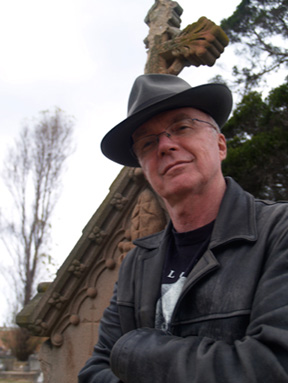
Though best known as a horror writer, Robert Hood's stories encompass a variety of genres, including crime, SF, fantasy and horror. It is for the
latter that he is best known. He has been widely published since 1975, his stories appearing in major anthologies and magazines worldwide, and has won
several major awards for his work. Many of his stories have appeared in the collection Day-dreaming on Company Time (FIP, 1988), in the collection
of ghost stories, Immaterial (MirrorDanse Books, 2002) and in the recent Creeping in Reptile Flesh (Altair Australia Books, 2008). Robert
has also published the novel Backstreets (Hodder Headline, 2000) and the YA supernatural thriller series Shades (Hodder Headline, 2001).
As well as writing many children's books, including the comic horror series Creepers (with Bill Condon, Hodder Headline, 1996-1997), he has
edited anthologies, not least of which is the award-winning Daikaiju! Giant Monster Tales (Agog! Press, 2005, with Robin Pen) and its two
sequels. He has also written plays, an opera libretto, an interactive tale for mobile phones, articles on genre cinema and award-winning film
commentary.
A full bibliography can be found at Robert's own website by clicking here. Please note all photos of the
Author are the intellectual property of Cat Sparks and are used here with express permission. If you would like to include the images on your own web
site then please contact either Robert or Cat (Click Here) before proceeding to do so.
Editor's Note: There's something a little daunting about interviewing an Author of the status of Robert Hood, especially if you
are doing so for a small press site that is just coming onto the radar of most dark genre fans Down Under. Our first shock was that Robert agreed to the
interview considering he is in the processing of writing a new novel. Our second shock was that Robert was what my father used to call a gentlemen and
what we would term a decent bloke. ScaryMinds would like to thank Robert for taking time out to talk to us and wish him all the best for the future.
Hope everyone enjoys the interview and we would stress that Robert Hood is a must read Australian author for both dark genre and non-horror fans alike.
ScaryMinds - When and why did you decide rather than doing something easy with your spare time, like playing a contact sport,
for example, you would be better off writing tales of mystery and imagination?
Robert Hood - Well, I toyed with the idea of alligator wrestling as a better choice, but was put off by the inevitable Ocker
wildlife series.
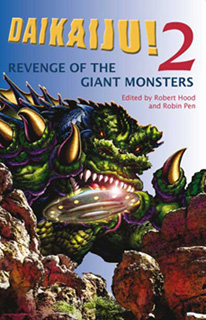 Seriously though, writing never felt like a choice, more like a necessity. I need to write because when I don't I get twitchy and depressed -- and when
I write it's mostly "imaginative" stories that come out. The first "formal" stories I remember coming up with were done in primary school -- stupid,
pun-based pieces of what would now be called "flash fiction", very cartoony. They amused me, though probably not the teacher. By the first year of High
School I was writing a bad Dr Who-type scifi novel about alien invaders and man-eating plants, scribbled in a series of exercise books, often during
maths lessons. No one except me has ever read it nor ever will!
Seriously though, writing never felt like a choice, more like a necessity. I need to write because when I don't I get twitchy and depressed -- and when
I write it's mostly "imaginative" stories that come out. The first "formal" stories I remember coming up with were done in primary school -- stupid,
pun-based pieces of what would now be called "flash fiction", very cartoony. They amused me, though probably not the teacher. By the first year of High
School I was writing a bad Dr Who-type scifi novel about alien invaders and man-eating plants, scribbled in a series of exercise books, often during
maths lessons. No one except me has ever read it nor ever will!
Meanwhile, all my English writing classwork ended up being fantastical in nature. Where others were writing one page on some dreary "real-world" topic,
I'd turn up with ten-page tales of intergalactic or chthonian mayhem. Teachers tried to divert me from writing scifi and fantasy-horror by giving me
topics that didn't lend themselves to either subgenre -- you know, "What I Did In My Holidays" or "Modern Music" -- but they ended up getting stories
about monsters living in trailer parks, astronauts stranded in orbit by global holocaust, or dead Baroque musicians manifesting through modern rock
songs. Eventually the teachers gave up and let me do what I liked. One even berated me once because I'd written an 8-page fantasy story in an exam --
the problem not being the nature of the story but that I hadn't managed to finish it during the allocated time and the teacher wanted to know what
happened. I got good marks, but felt obliged to complete it for her anyway.
I'm sure it was back when I was in primary school that I decided romping around in my imagination was way more interesting than focusing on an
occupation more grounded in reality. As Stanley Kubrick said when asked about realism in cinema: "Real is good. Interesting is better."
ScaryMinds - What problems does a writer of the macabre face with getting acceptance by the wider reading community in
Australia and is it getting any better?
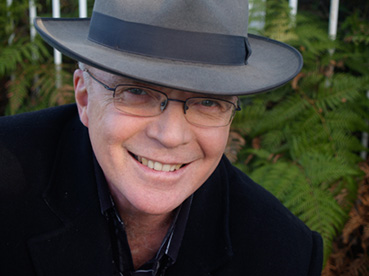 Robert Hood - There seems to be a lot more literary crossover than there used to be, partly because "legitimate" writers have
discovered what the rest of us knew long ago -- that fantastical themes offer a rich and evocative set of tropes and images that allow you to write
everything from compelling adventure stories to powerful metaphysical explorations into the nature of life, the universe and everything.
Robert Hood - There seems to be a lot more literary crossover than there used to be, partly because "legitimate" writers have
discovered what the rest of us knew long ago -- that fantastical themes offer a rich and evocative set of tropes and images that allow you to write
everything from compelling adventure stories to powerful metaphysical explorations into the nature of life, the universe and everything.
Existing in a literary ghetto is something that long-time writers of the macabre have had to live with for a long time. The attitude still arises these
days, even though Stephen King's mega-success gave the genre a certain commercial validity. But that has been partly the fault of those in the ghetto,
many of whom have never really believed that what they were doing had any intellectual value outside of rather elusive commercial success and have
spoken depreciatingly of their work. Generally the majority don't push the envelope all that much either. The popular genres do suffer from having been
considered -- by practitioners and readers alike -- as purely narrative-driven. Language in its own right hasn't always been a big consideration,
sometimes even scorned by genre writers. For me, the truth is that the genre distinctions are a marketing convenience, and the distinction between
literary and non-literary isn't "Literary Writing" vs "Popular Writing", but simply good writing vs bad writing -- something that transcends genres,
whether in the literary mainstream or not.
Mind you, I also think that the horror genre seen as a separate entity (which is actually rather hard to do) tends to thrive in the ghetto. At its best
it skirts the edge of the socially acceptable in terms of themes and imagery. It may be easier to see the boundaries when you're in the gutter than it
is when you're living in a comfortable penthouse.
But whatever we say, and however we define what has value and what doesn't, it's all just border protection. To scorn writers of the macabre as
"non-literary" and hence valueless is to dismiss recognised classics from "The Epic of Gilgamesh" through Homer and Shakespeare and Mallory to Robert
Louis Stevenson's "The Strange Case of Dr Jekyll and Mr Hyde", the work of H.G. Wells and hundreds of other non-naturalistic classics. The 19th Century
supremacy of the "naturalistic novel" as the literary standard for "serious" writing is a relatively new phenomenon -- and increasingly seen as the
meaningless pretension and nonsensical dead-end that it is.
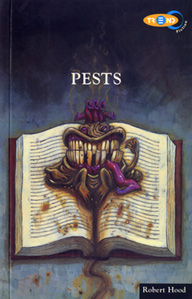
ScaryMinds - Do you have plans to tackle the great Australian horror novel or can we look forward to more story collections in
the near future?
Robert Hood - I continually plan to write the great Australian horror novel -- though in reality I'm much more interested in
simply writing an effective novel of whatever kind suits my subject of choice. The Australian bit only enters the equation because I filter experience
through an Australian sensibility whether I like it (or even think about it) or not. As for the horror side of the equation: I'm nearly finished a
horror novel that I've been writing for years, though whether it is great or not is rather a moot point and not something I think about -- greatness
is, after all, determined by posterity, not the author.
I also keep veering into areas that make genre definition difficult. To me, Backstreets was a horror novel, though to the publisher and to most
of its readers, no doubt, it was young adult mainstream. And indeed there's no direct violence and only an ambiguous suggestion of the supernatural in
it, so where does it fit in the genre? Probably not being classified as horror was a good thing in that it sold better in certain key markets than it
might have otherwise.
The current novel has a much more genre-based approach and includes a fair amount of violence, gore and supernatural imagery -- yes, including a
zombie (though it's a zombie with a difference). As for producing more story collections: I will always write short stories because I love the short
form despite the fact that writing them doesn't do much to foster a "successful" writing career or to bring in much money. Because I will always write
them, there's always the possibility of another collection. I loved doing the most recent collection, Creeping in Reptile Flesh, because it not
only gave me a chance to get some older, more obscure work out there again, but it also allowed me to write the titular novella. 20,000 words is a
difficult length to sell to a magazine or anthology (though there are a few small-press publishers around that are dabbling in the form at the moment).
ScaryMinds - If you had the option of writing full time would you grab that opportunity with both hands or run screaming into
the night from it?
Robert Hood - I always thought I would definitely go with writing full-time if I could, and I suppose if, for example, I was
offered a huge contract with tight deadlines I would do so, through necessity. But I've actually gone off the idea somewhat lately, watching friends
who have succeeded in this way become increasingly constrained by deadlines and publisher expectations. I'm not sure I could produce the type and
quality of work that I want to produce to that sort of timetable -- not continually. I've done it once or twice but in a limited way -- as one-offs.
That was hard enough. I admire those who manage it.
For myself I think I might find fulltime less productive than, say, three days a week. That would be my ideal. Three days work, three writing, one
relaxing. I've been working full-time in a job that allows a certain flexibility for 20-odd years now -- and it is creative (graphic design) without
being creative in the same way as my writing, a situation that might be a bit draining. Nevertheless it tends to be rather full-on and I'm frequently
too tired to write at home afterwards. You feel like you never relax. It takes a lot of discipline and sometimes discipline uses too much energy. So I
would like to achieve the three-day plan one of these days, finances permitting. No sign of it yet.
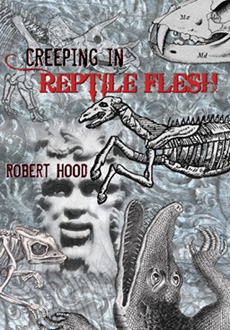
ScaryMinds - What's more important, raw talent or continued development via actual writing?
Robert Hood - Continued development through sheer hard work is way more important than raw talent (if such a thing even
exists). There are very few writers who possess raw talent without the hard work. And of those I've known who have clearly had something we might
call "raw talent", many have gone nowhere with it. It's the determination that matters. Write a lot and write intelligently. That's the key to being
good. Being "successful" is another matter. That depends on the hard work, persistance and a host of factors that you can't control.
ScaryMinds - How do your family and friends handle having a dark dreamer in their midst?
Robert Hood - My partner Cat is fine with it, of course. She can be quite the dark dreamer herself. It has, however, always
bemused and disturbed my mother, who is a mild-mannered, loving person with a strongly Christian sensibility. I sometimes put a quote in bios for
anthologies that says: "He used to be a nice boy" (Rob's mum). It's only partially a joke. She's very supportive and accepts me no matter what, but I
think she's only read two of my stories: the first one I ever sold (which I guess told her that it wouldn't be wise to read any more) and the novel
Backstreets (because of its history). She frequently asks: "Why don't you write something nice so I can read it?" and of course I always reply,
"All my stories are nice."
As for friends, most of them are writers anyway and are therefore completely open to the genre. At work? I work in a Commerce Faculty and I think the
people there are sort of intrigued and amused by the fact that I'm well-known as a horror writer. It's not something you find in Commerce faculties all
that often.
ScaryMnds - Do you write a story to a set outline or do you let the story grow in the telling?
Robert Hood - Sometimes I feel as though I should plan stories more, but the fact is I don't. Stories develop as I go along.
This requires backtracking, massive re-writes and is far from time-efficient. But for me this process is creative and exciting, as against working to
a pre-conceived outline, which ultimately I find to be dull and lifeless.
Sooner or later in the creation of a story, though, whether short or long, I have to develop a more coherent sense of its structure and ultimate
conclusion, but the whole picture is rarely there right from the start.
ScaryMinds - Where do you get your story ideas from? Do you keep a diary of random thoughts and observations?
Robert Hood - Ideas come from everywhere. I listen. I read. I experiment with ideas, putting them together in a fictional
context to see what happens. To have a good idea as an initial inspiration is great, but an idea isn't a story. Sometimes it takes a long time and
many different attempts to find the right story to explore the idea. Sometimes it never comes. But a story can start from a character, a setting, an
event, a phrase, an image. It's what you built up around them that matters. In lieu of having a story to start with, the best way to start can be to
create an interesting character in an unusual setting. A good character can make a good story even in the absence of a good idea. A good idea without a
good character to carry it is nothing but a good idea wasted in a bad story.
I don't keep a formal idea diary, but I do have assorted notebooks where I jot down ideas, names, phrases, snatches of overheard dialogue, titles,
themes… anything that crops up. I'll look through those when I'm looking for a starting point. Putting disparate things together can be very inspiring.
Sometimes reading an interesting non-fiction book or article can be a great source of inspiration, too.
I actually enjoy writing for limited theme anthologies because the constraints imposed can force my imagination to look for a story that I know won't
be like the others that will be submitted. The first thing that comes to mind will most likely be the first thing that comes to everyone's mind. So I
look for the tenth or twentieth thing that comes to mind.
ScaryMinds - When you sit down to write do you have a word count or page count that defines a good day's writing?
 Robert Hood - Not really. Any number of words that are satisfying is a good day's writing. Even if I'm working at it all day,
the most I can achieve is about 4000 words. Beyond that my brain stops. On working days, doing 100 words is good. Some days I manage much less --
anything down to zero. I recently spent a month's worth of leave writing a book. I'd say I still averaged only 400-500 words a day -- some days more
(max. 2500, I think), some days less. Yet the day I went back to work, when I came home that night, I sat down and wrote 500 words in half an hour. Go
figure! The number of words I can manage is rather dependent on the difficulty of the project and how clearly I know where I'm going. The project I'm
working on is a complex one with a very non-linear narrative structure. It's slow going -- but I'm very pleased with the results so far!
Robert Hood - Not really. Any number of words that are satisfying is a good day's writing. Even if I'm working at it all day,
the most I can achieve is about 4000 words. Beyond that my brain stops. On working days, doing 100 words is good. Some days I manage much less --
anything down to zero. I recently spent a month's worth of leave writing a book. I'd say I still averaged only 400-500 words a day -- some days more
(max. 2500, I think), some days less. Yet the day I went back to work, when I came home that night, I sat down and wrote 500 words in half an hour. Go
figure! The number of words I can manage is rather dependent on the difficulty of the project and how clearly I know where I'm going. The project I'm
working on is a complex one with a very non-linear narrative structure. It's slow going -- but I'm very pleased with the results so far!
ScaryMinds - Do you have a favourite horror subgenre to work in or does the story pretty much dictate the environment?
Robert Hood - The story tends to dictate what happens to the genre elements in it. As a result, many of my stories are crossover
in nature, slipping between subgenres and sometimes right out of them. Mixing it up keeps things interesting for me, and so, hopefully for the reader.
However, having said that, I have written an inordinate number of ghost stories. Many of them may be unorthodox or non-traditional in nature, but
they're still ghost stories, so I guess that says something about my predilections.
ScaryMinds - When working do you prefer pen and paper or more modern equipment?
Robert Hood - Give me a computer any day. Back at the beginning of the home computer revolution, after I'd been writing with
pen-and-paper then transferring the text onto submittable paper via a typewriter, my first acquisition of a very low-grade computer came as a
revelation. It made life so much easier. I'm an obsessive editor and re-writer. All that re-typing from scratch was stultifying. It limited my
imagination and certainly my accuracy. Now the only time I use pen-and-paper is sometimes when I'm stuck on something, some sequence that isn't clear
in my mind. I'll go to pen-and-paper and scribble. For some psychological reason I'm more inclined to allow myself to leave gaps, skip over bits. When
I then go to the computer to type it up, the bits I skimmed over tend to get filled out more readily.
ScaryMinds - What's on the horizon for the reading public from Robert Hood?
Robert Hood - There are short stories out there, though in the current financial climate, it's hard to say when some of the
stories I've sold will actually appear. Some anthologies are being held back. I've just finished a rather odd horror story about the Sumarian hero
Gilgamesh for Mark Deniz's anthology In the Footsteps of Gilgamesh. I have a number of other solicited stories to write in the next few months.
Most significantly I'm in the process of finishing a short YA novel titled Robot War Espresso for Twelfth Planet Press -- it features clunky
robots, VR, a metal circus ... and coffee. The horror novel I mentioned earlier should be completed this year, though it doesn't have a publisher and
therefore may never find one. I'm trying to sell a noirish dark-crime novel titled Scavengers, which I hope I sell soon because I love it and
want to write more featuring the main character! It's crime rather than horror, but I tend to cross over to horror in my crime stories quite often.
ScaryMinds - What advice would you give aspiring Australian dark genre writers?
Robert Hood - Write a lot. Be interesting. Revise a lot. Revise again. Make your work as original, tight and vivid as you can. That takes
effort. I see too much material -- even in print -- that is first draft or careless second draft at best. You're not doing yourself any favours by
sending crap out into the world, even if some less-than-prestigious magazine or online website will publish it. CVs full of low-quality publications
don't do your career any favours, even if you've acquired 50 of them since you started writing a month ago. One strong story in a recognized
high-quality journal (whether or not it pays decent money) is better than dozens of weak ones in no-name, undiscriminating markets. More to the point
I don't want second- or third-rate stories with my name on them hanging around for posterity to read. Do you want crap of yours out there? Sure, some
work of lesser quality will get through simply because you can't always recognise that a story isn't very good until it's too late, but you should make
every effort to make sure it doesn't happen often. Aiming low from the beginning isn't the way to go.
Apart from all that -- enjoy yourself. When it becomes a chore and never gives you the buzz of having created something that excites you to the core,
then stop writing and take up something easier -- like alligator wrestling.
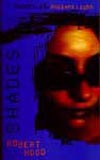
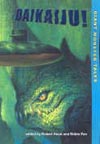
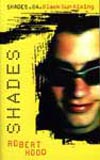
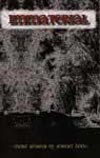
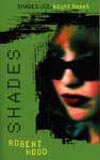
Scaryminds would like to thank Cat Sparks for use of the original photos. We would also like to give a huge thanks to Robert Hood for taking time out of
his busy schedule to answer our questions. Good luck with the Writing Rob, we look forward to reading a whole bunch more of your stories and novels.
Interested in furthering your Robert Hood knowledge? Please visit the following sites to keep up to date with one of Australia's living treasures.
Robert Hood News, publications, and about everything you need to know to keep current with the Author.
Undead Backbrain Robert Hood's official blog and review site. Check out what Rob has to say about various
movies, events going down, and gosh I believe you may even run across zombies and giant monsters.
Undead Brain Spasm Robert Hood is taking over the net!




 Seriously though, writing never felt like a choice, more like a necessity. I need to write because when I don't I get twitchy and depressed -- and when
I write it's mostly "imaginative" stories that come out. The first "formal" stories I remember coming up with were done in primary school -- stupid,
pun-based pieces of what would now be called "flash fiction", very cartoony. They amused me, though probably not the teacher. By the first year of High
School I was writing a bad Dr Who-type scifi novel about alien invaders and man-eating plants, scribbled in a series of exercise books, often during
maths lessons. No one except me has ever read it nor ever will!
Seriously though, writing never felt like a choice, more like a necessity. I need to write because when I don't I get twitchy and depressed -- and when
I write it's mostly "imaginative" stories that come out. The first "formal" stories I remember coming up with were done in primary school -- stupid,
pun-based pieces of what would now be called "flash fiction", very cartoony. They amused me, though probably not the teacher. By the first year of High
School I was writing a bad Dr Who-type scifi novel about alien invaders and man-eating plants, scribbled in a series of exercise books, often during
maths lessons. No one except me has ever read it nor ever will! Robert Hood - There seems to be a lot more literary crossover than there used to be, partly because "legitimate" writers have
discovered what the rest of us knew long ago -- that fantastical themes offer a rich and evocative set of tropes and images that allow you to write
everything from compelling adventure stories to powerful metaphysical explorations into the nature of life, the universe and everything.
Robert Hood - There seems to be a lot more literary crossover than there used to be, partly because "legitimate" writers have
discovered what the rest of us knew long ago -- that fantastical themes offer a rich and evocative set of tropes and images that allow you to write
everything from compelling adventure stories to powerful metaphysical explorations into the nature of life, the universe and everything. Robert Hood - Not really. Any number of words that are satisfying is a good day's writing. Even if I'm working at it all day,
the most I can achieve is about 4000 words. Beyond that my brain stops. On working days, doing 100 words is good. Some days I manage much less --
anything down to zero. I recently spent a month's worth of leave writing a book. I'd say I still averaged only 400-500 words a day -- some days more
(max. 2500, I think), some days less. Yet the day I went back to work, when I came home that night, I sat down and wrote 500 words in half an hour. Go
figure! The number of words I can manage is rather dependent on the difficulty of the project and how clearly I know where I'm going. The project I'm
working on is a complex one with a very non-linear narrative structure. It's slow going -- but I'm very pleased with the results so far!
Robert Hood - Not really. Any number of words that are satisfying is a good day's writing. Even if I'm working at it all day,
the most I can achieve is about 4000 words. Beyond that my brain stops. On working days, doing 100 words is good. Some days I manage much less --
anything down to zero. I recently spent a month's worth of leave writing a book. I'd say I still averaged only 400-500 words a day -- some days more
(max. 2500, I think), some days less. Yet the day I went back to work, when I came home that night, I sat down and wrote 500 words in half an hour. Go
figure! The number of words I can manage is rather dependent on the difficulty of the project and how clearly I know where I'm going. The project I'm
working on is a complex one with a very non-linear narrative structure. It's slow going -- but I'm very pleased with the results so far!




